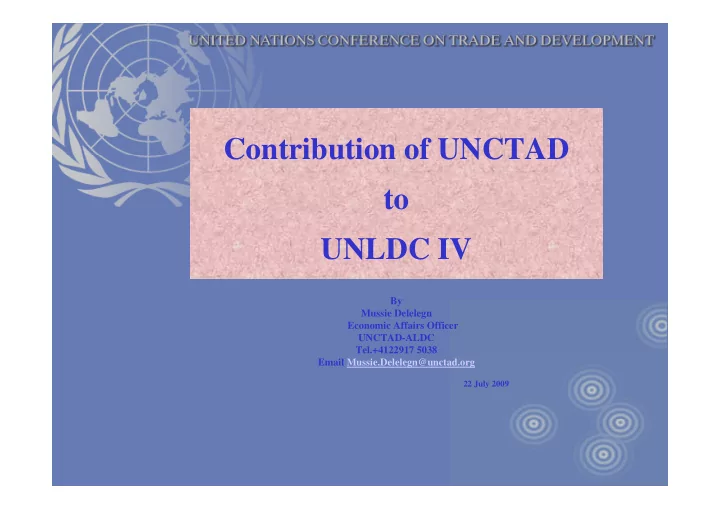

Contribution of UNCTAD to UNLDC IV By Mussie Delelegn Economic Affairs Officer UNCTAD-ALDC Tel.+4122917 5038 Email Mussie.Delelegn@unctad.org 22 July 2009
UNCTAD and LDCs: some key facts as background • It was in UNCTAD that the concept and category of LDCs was first born: � In 1964 at UNCTAD I the report of the first SG of UNCTAD called for differentiation between DCs � In 1968, at UNCTAD II resolution 24 [II] called for special support measures � In 1969, UNCTAD identified 30 LDCs
UNCTAD developed and used the first set of criteria: i. per capita GDP ii. the percentage of manufacturing in GDP; iii. percentage of manufacturing products in total exports; iv. per capita consumption of energy; v. the number of medical doctors per 100,000 inhabitants, and vi. the combined primary and secondary school ratio
The criteria complex? ► In 1971 ECOSOC and the Committee for Development Planning (now Policy)- [CDP] called for further refinement of the criteria ► The criteria were, then reduced to three: i] Per capita GDP of less than USD100 at 1965 factor cost or price; ii] share of manufacturing under 10 %of GDP and iii] an adult literacy rate under 20% ► In 1972, the GA identified 42 countries as LDCs
Major outcomes of UNCTAD’s earlier work on LDCs led to: • global consensus; • political commitment; • convening of three UNLDC Conferences; • adoption of three decennial PoA [ SNPA for the 1980s, PoAs for the 1990s and for the decade 2001- 2010]; • improvements in criteria (1990s) used for inclusion into and graduation from the LDCs group (low income USD750-900, Human Asset Index, Economic Vulnerability Index)
Some concrete results from UNLDC processes: are these sufficient? • ODA has doubled between 2001-2008 • Several LDCs benefited from debt relief initiatives • Significant proportion of ODA to LDCs is untied • Close to 90 % of LDC exports now receive market access • Private investment [domestic and international] has shown remarkable increase • In some countries remittances emerge as the main sources of development finance • LDCs introduced liberal trade and investment polices; removed distortions • In several LDCs economic governance and management also improved • Several LDCs put in place poverty reduction policies and strategies • LDCs as a group registered an average annual growth rate of about 8% during 2005-2007 as compared to 5.9% in 2000-2004
Key lessons from previous conferences • The challenge of poverty reduction; Problem of disaggregating key factors; • • The need for policy space and ownership; Apparent failures of liberalization policies, including SAPs; • • Disregard to endogenous conditions and solutions; • Prioritization and the productive sectors of LDCs; Excessive emphasis on mitigating short term shocks; • • The PoAs were considered only as add-on policy document; • The problem of process overload or congestion in LDCs, • Paucity of resources • Awareness creation, advocacy and mobilizing public action
UNLDC IV: some preliminary views UNLDC IV should build on LDC III but redress weaknesses thereof • It should lead to consensus on: ► rebuilding developmental states in LDCs ► forging a new form of partnership between LDCs and their development partners ► a set of polices to enhance the developmental dimension of agriculture ► further scaling-up of development aid, improving its effectiveness and its ensuring sectoral redistribution ► developing framework for monitoring the implementation of its outcome including at the national levels • It should also provided policy guidance on how to sustain the flow of remittances to LDCs It should also lead to agreements a new generation of international • support measures in favour of LDCs
UNCTAD’s contribution to UNLDC IV • UNCTAD will make available to the Conference: � Synthesis of findings and conclusions from its research and policy analysis; � Lessons from technical cooperation and capacity building functions; � Proposals and recommendations from an expert meeting on new and non-traditional exports of LDCs [such as horticulture]; � Outcomes of annual reviews and assessments by the TDB of progress; UNCTD also intends to sponsor at least one pre-conference or side • event; • UNCTAD will assist OHRLLS in negotiating Host Country Agreement, building on its rich experience in this area • UNCTAD and the OHRLLS will join hands in mobilizing resources
Finally, THANK YOU
Recommend
More recommend